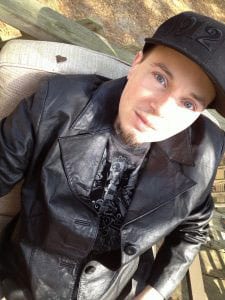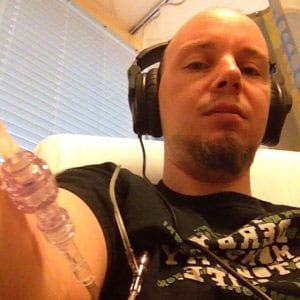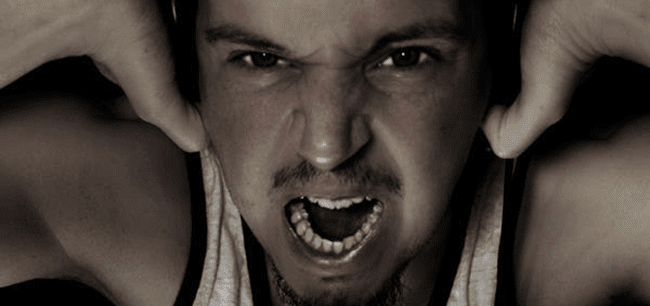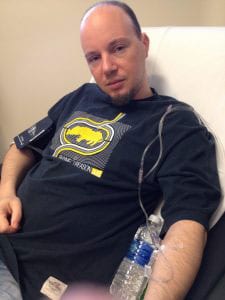Anyone diagnosed with a chronic illness has two choices.
Option 1: Accept it, live life idly, and wait to meet your maker.
OR
Option 2: Accept it, learn what the next steps are, and fight like hell to make a difference.
Ric chose the latter and we sat down to hear what drives a common variable immune deficiency (CVID) patient to take that next breath despite all the challenges.

Ric: “All of a sudden I popped up with a skin infection and it didn’t go away for months, no amount of creams or anything would get rid of it. I also started getting quite frequent sinus infections.”
PW: Were you ever misdiagnosed?
Ric: “I was misdiagnosed several times with everything from scabies to common stuff like athletes’ foot. Just recently before my diagnosis I had strep throat four times in five months. It got so bad that it almost turned into Scarlet fever. I sweated through an entire mattress and memory foam.”
At this time Ric wouldn’t even be admitted to the hospital because he had been misdiagnosed with lupus and it was thought that he was simply having a flare up.
It ended up taking eleven doctors and four years for Ric to be correctly diagnosed. Ric still had the diagnosis of lupus and was dealing with a rampant skin infection at the time. He was prescribed steroids and steroid cream which only made things worse. He then was referred to a rheumatologist.
Ric: “I told him [the rheumatologist] about the reoccurring skin infections and sinus issues I was having. When they did blood work it came back negative for all the RA factors but my total IgG [an antibody] came back at 412 which for a normal person, is typically between 1,000 and 1,200.”
PW: After that were you referred elsewhere?
Ric: “Well funny story, the rheumatologist wanted me to quit work, and quote ‘live in a bubble.”
PW: It doesn’t look like you followed that?
Ric: “Not so much. It’s very hard to make a living working from home. It’s possible, but it’s very hard. You have to do quite a bit to be able to work from home; you need a quiet place to work, office furniture, a computer and internet.”
Since Ric began getting so sick he’s been working in a call center. He used to do all kinds of work but decided a switch would be best so his work wouldn’t be too hard on his joints.
For many years Ric has produced music. It’s been a career he’s been tirelessly and passionately pursuing. Due to his recent illness however, he had to cancel his collaborations and DJ events for the entirety of this summer. He’s not going to abandon his music by a long shot though.

PW: What kind of treatment are you taking?
RIC: “30 -40 grams of IVIgG which is helping, but doesn’t completely cure me so to speak. I’m also on quite a bit of antihistamines because when my immune system went wonky the remaining parts became hyperactive which is when I got Psoriatic arthritis and developed allergies for things I’ve had my whole life; coffee chocolate, cats, dogs… it’s been a struggle. I had a full allergy panel done where I discovered all the allergies. To put some perspective on it, being allergic to coffee and dairy, I’m actually a master barista and have worked in coffee shops my whole life and I’ll never be able to do that again.”
PW: Are you part of any advocacy groups?
Ric: “I’m on a secret Facebook page for CIVD patients and that’s been tremendously helpful. I’m always in to getting into advocacy groups; I think it would be a great thing to be able to bring awareness about this rare condition to the world using social media connections.”
PW: Do you often have to explain CVID to others who don’t know about the condition?
Ric: “All of the time. If I get something simple like an ear infection or catch a cold it’s a serious issue for me so I’ll end up in a local emergency room or urgent care. I always ask the doctor, ‘What is your experience with immune compromised patients?’ and if the doctor can’t answer that I ask for another because I have to explain it to them, that I’m missing all these antibodies. It’s a struggle, you almost have to educate people whose job it is to be educated about this. I do find some things helpful when explaining to lay people. Like when my family friends ask I point them to primaryimmune.org, or there’s an episode of House, season 1 episode 17, which explains the condition.”
PW: Has there been humor in any of your experiences with CVID?
Ric: “I try to take it with as much humor as possible because this is really a mind-blowing almost silly kind of thing. I like to use humor in posting funny pictures to make people think about CVID. I also have been known to quote the movie Innerspace, which was one of my favorite movies growing up and there’s a lot of neat stuff in that movie about the immune system. My wife has a nickname for me; she calls me captain contagion.”
PW: If you just met someone newly diagnosed with CVID what one thing do you think is most important to tell them?
Ric: “The biggest piece of advice I could give is a quote from Stephen Hawking who has ALS. He has been bound to a power chair and unable to speak for many years but he’s been able to change the face of physics and the way we think about the universe. He said that ‘While there is life, there is hope.’ He’s an amazing individual and an inspiration to me in a lot of ways.”
PW: What do you most hope for in the future?
Ric: “One of the things that I really hope for the most is to raise awareness and with awareness comes interest and with interest will hopefully come more research and into the genetic components of CVID. Hopefully, although maybe not in my generation, there will be some type of gene therapy so we could produce antibodies again on our own. So it will be curable instead of treatable. There has to be a lot of changing in the way we view chronic and rare diseases. There’d have to be a paradigm shift for our lawmakers and government corporations to focus on preventing rather than treating; finding cures.”
PW: Is there anything that bothers you in regards to CVID and reactions and interactions with other people?
Ric: “Yes, I’ve developed a pet peeve; people with bad manners. For example, not covering your cough or when you sneeze, not using hand sanitizer. It drives me crazy and when you explain it to them and they look dumbfounded. They should go google it [CVID] and educate themselves. You have to help people understand that their actions or inactions have consequences to the people around them whether they know them or not. So it’s not just a fight about a rare disease but personal responsibility and understanding another person’s view point.”
PW: Who has been your greatest support?
Ric: “My wife, Janet. She’s been the reason why I get up and go to work on days that I’m able to. The reason why I’ve decided to go through with crowdfunding my next album which is scary and exciting. She’s the reason I decided to go through with treatment because I wanted to be healthier and be able to be with her longer. We’ve been together for fifteen years and married for thirteen. She’s been my biggest support, biggest fan, and best friend.”

That’s what option 2 looks like. Which would you choose? Share in the comments below.
Get in contact with Ric through his facebook page if you want to learn more about CVID groups or just chat with someone going through similar situations
Check out Ric’s music and drop him some coin to help keep his love for music alive while you are at it. Click one of those little buttons to the left to share Ric’s impactful story in your social circles.
All images sourced from Ric








